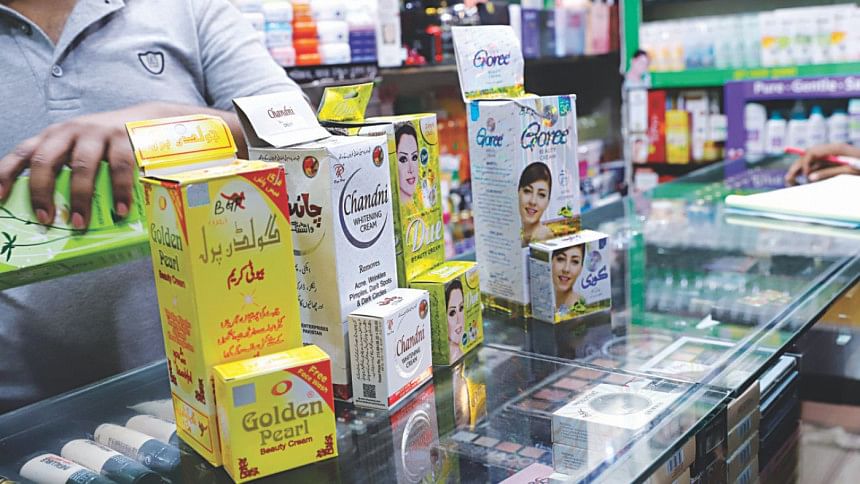Beauty s-care

Sumi Akhter was on the lookout for a skin lightening cream as she wanted to appear fairer at her sister's wedding just two weeks away.
She found her desired product at a cosmetics shop in the capital's Hossainia Market. The Pakistan-made cream promised lighter skin tone in seven days.
The college student had no idea that the excessive amount of mercury usually found in such products can not only damage skin permanently but also cause fatal diseases.
A recent study found that the amount of mercury in 14 out of the 32 skin lightening cream samples collected from the market were 90 to 16,000 times higher than the 1ppm (parts per million) limit set by the 2013 Minamata Convention on Mercury.
Bangladesh is a signatory to the convention, which aims to protect human health and environment from mercury emissions and ban its use above 1ppm in products after 2020. The convention ratified by 101 of 128 signatory countries has not been ratified by Bangladesh.
The Zero Mercury Working Group (ZMWG), a coalition of NGOs from over 50 countries, revealed the findings on November 15 last year.
Of the 14 creams with higher mercury, six were manufactured in Pakistan, three in Taiwan, one in China and one in Bangladesh. The report does not mention the origin of the three other products.
The Group selected 338 skin-lightening products from 22 countries and checked their mercury levels at the Biodiversity Research Institute in the US and the Quality Assurance and Control Systems Lab in Greece.
The results revealed that the amount of mercury in those 34 samples ranged from 93 to an astonishing 16,353ppm.
“It's like warming your body beside a fire during winter. Initially, you'll find it comfortable but when you continue to keep your hands in it, you get burns,” said Prof Md Shahidullah Sikder of Department of Dermatology, BSMMU.
“Mercury initially lightens the skin tone but eventually damages the skin and leaves it darker than before.”
He warned that long-term use of such products increases the risk of kidney complications.
Bangladesh Standard Testing Institute (BSTI) claims it cannot control the sale of such products as the government allows import, production, sale and distribution of whitening, acne, medicated and therapeutic creams.
MERCURY: ITS EFFECTS
Mercury is often added to skin lightening products like bleaching, whiteners, brighteners, and fading creams.
“People who want to get fairer within a short time prefer these kinds of creams,” said Md Parvez, a salesperson at a cosmetics shop in Hossainia Market.
Both men and women buy the products, he said.
The use of skin-lightening creams and soaps is widespread across the globe, especially in Asia, the Middle East and Africa.
Global sales of these products stood at $17.9 billion in 2017, and are projected to reach $31.2 billion by 2024, according to Global Industry Analysts, a reputed publisher of off-the-shelf market research.
According to the ZMWG report, many users living in regions where they frequently get exposed to ultraviolet rays are in greater risks of skin cancer.
Many active ingredients in commercially available formulations specifically target the production of the pigment melanin in the skin cells, effectively destroying the natural ability of the skin to protect itself from UV light, it reads.
Besides causing rashes, discoloration, scarring, and reducing the skin's resistance to bacterial and fungal infections, inorganic mercury present in skin-lightening products may even damage kidneys, according to the World Health Organisation,.
Other health effects may include anxiety, depression and peripheral neuropathy.
“Toxic trade in illegal high mercury skin lighteners is a global crisis which is expected only to worsen with skyrocketing global demand,” said Elena Lymberidi- Settimo, the international co-ordinator of ZMWG.
“To combat this, it's important for governments to quickly enact and enforce regulations and effectively warn consumers,” she added.
Environment and Social Development Organisation Chairperson Syed Marghub Murshed urged the government to take regulatory and legislative actions to protect the future generation from a serious health hazard.
SM Ishaque Ali, director at BSTI, admitted that some whitening creams available in the market contained high levels of mercury.
“We do not give them clearance,” he said.
Deputy Director (Certification Marks) of BSTI Reazul Haque said, “We have some limitations as exemption is given to specialised whitening, acne, medicated and therapy creams. This is why we cannot launch drives and seize the products from in market.”

 For all latest news, follow The Daily Star's Google News channel.
For all latest news, follow The Daily Star's Google News channel. 




Comments